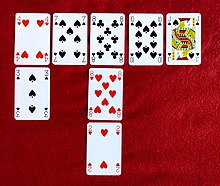You can help expand this article with text translated from the corresponding article in Russian. (December 2016) Click [show] for important translation instructions.
|
 A game in progress: the top row is a sequence of valid plays, the cards below are past, invalid plays. (The game began with a 4 of hearts, followed by an invalid play of the 3 of spades, then a valid play of the 7 of spades.) | |
| Type | Inductive logic |
|---|---|
| Players | 3–8 (best with 4 or 5) |
| Skills | Invention, induction |
| Cards | Single Deck of 52 or Double Deck of 104 |
| Deck | French-suited |
| Playing time | 60 minutes upwards |
| Chance | Low |
| Related games | |
| Mao | |
Eleusis is a shedding-type card game where one player chooses a secret rule to determine which cards can be played on top of others, and the other players attempt to determine the rule using inductive logic.
The game was invented by Robert Abbott in 1956,[1] and was first published by Martin Gardner in his Mathematical Games column in Scientific American magazine in June 1959. A revised version appeared in Gardner's July 1977 column.
Eleusis is sometimes considered an analogy to the problems of scientific method. It can be compared with the card game Mao, which also has secret rules that can be learned inductively. The games of Penultima and commercially produced Zendo also feature players attempting to discover inductively a secret rule or rules thought of by a "Master" or "spectators" who declare plays legal or illegal on the basis of the rules.
- ^ "Eleusis" (p.30) in 101 Great Card Games by David Galt, Publications International, 1999. ISBN 0-7853-4044-0